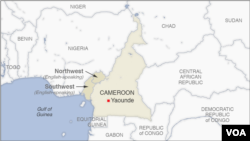Cameroon is asking civilians to return to towns in Francophone regions of the country after Anglophone separatists entered a French-speaking village in the West region and killed four government soldiers. The military says the separatists took weapons and freed suspects from prison before returning to their hideouts in the English-speaking North-West region.
In a disturbing video released by the separatists, a man, calling himself commander of fighters in Ngo-Ketunji, an administrative unit in Cameroon’s English-speaking North-West region, his face unseen, is holding a human hand as a trophy, allegedly cut from one of the victims, a soldier in the French-speaking West region of Cameroon. Beside him are 12 people holding rifles and machetes. The man says the men are his fighters, back from an operation.
The video, whose authenticity VOA hasn't independently verified, is widely circulating on social media and local radio and TV stations. It was allegedly released by Anglophone separatist fighters, and the Cameroonian military has confirmed that weapons shown in the clip were seized from its troops Friday.
In the video, the man who calls himself a commander displays nine military rifles and military uniforms that he claims his group seized from Cameroon government troops in the French-speaking village of Galim. Galim, the Francophone town, shares a border with the Anglophone, or English-speaking, North-West region.
Awa Fonka Augustine, the governor of the French-speaking West region of Cameroon, where Galim is located, said fighters attacked a military camp in the vicinity Friday.
“We registered four deaths on the part of the military men as well as one [soldier] that is seriously wounded. I am seizing this opportunity to express the sympathy of the entire hierarchy to the families of the bereaved soldiers. It is again an opportunity for us to ask the raison d'être of all these [attacks]? Why do we continue killing ourselves in this manner? It is regrettable and it is an act to condemn,” he said.
Fonka said the fighters left unhurt after an intense shootout that lasted several hours.
The military confirmed the attack saying that four of its troops were killed on the spot. One was rushed to a hospital in the neighboring French-speaking town of Bafoussam, located in western highlands of Cameroon, where he is said to be responding to treatment.
Fonka said the fighters returned to their hideouts with weapons.
Arouna Hassan, a cattle rancher in Galim, said he escaped from Takijah, an English-speaking North-West village with his cattle in April 2018 when separatists attacked his family.
Hassan said his family and eight other internally displaced families were attacked at Galim. He said the fighters seized money from civilians. He spoke via WhatsApp from Bofoussam, where he has escaped for safety.
“They (the Anglophone separatists) went to the house and took my father. He paid a sum of money before they released him. All my belongings (clothes) have been taken by them (the fighters). They terrorized us. They took me, locked me, then I ran away. That is why I find myself here [in Bafoussam],” he said.
Hassan said several dozen civilians who live near the military camp escaped to the bushes.
Fonka and the military has been calling on fleeing civilians to return to Galim. The military says more troops have been deployed to protect lives and property.
Fighters have crossed over to Galim at least nine times. The fighters attack markets, schools and military positions in the neighboring French-speaking West region. Cameroon on several occasions said it had deployed more troops to stop the fighters.
Cameroon’s separatists have been fighting since 2017 to create an independent English-speaking state in the majority French-speaking country’s western regions.
The conflict has cost more than 3,000 lives and forced 550,000 people to flee to French-speaking regions of Cameroon or into neighboring Nigeria, according to the United Nations.
Cameroon Anglophone Separatists Stage Attack, Release Disturbing Video




